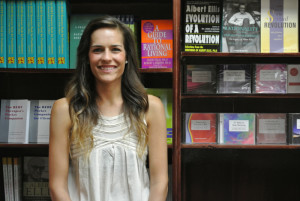by Shannon O’Neill, M.A.
I have learned an abundant amount of knowledge during my time at the Albert Ellis Institute and would like to share a piece of insight within my final blog. Upon receiving training and understanding that one’s evaluative thinking about adversity leads to dysfunctional emotional and behavioral consequences, it transformed my life. However, similar to what Ellis frequently explained, “Insight alone rarely enables people to undo their emotional disturbances.” I strongly agree with this statement, as I consider REBT to be a way of living. It is not a course of medication that an individual is eventually weaned off of. REBT requires continual work and practice in identifying one’s core irrational beliefs and actively disputing them in order to generate healthier emotions and behaviors. Therefore, I practiced and practiced and practiced some more. In short, while learning and utilizing REBT, I learned to personally implement rational living.
Engaging in rational living has included striving for unconditional self-, other-, and life-acceptance. This philosophy can be immensely challenging; however, upon slowing down and uncovering the beliefs that are influencing unhealthy emotions and behaviors, I have noticed that I frequently demand myself, others, and/or the world be different than what actually is. Because the world is not tailored to me, fairness and pleasantries are far from guaranteed. Therefore, thinking rationally and healthfully are effective choices I continue to consciously make and struggle with in order to prevent additional unnecessary distress. I want to thank my supervisors as well as my fellow externs for not only teaching me skills to become a better therapist but also a more rational and sound individual. Although many things in life are uncertain, I am quite confident I will be practicing rational living long after my rotation at the Albert Ellis Institute.

